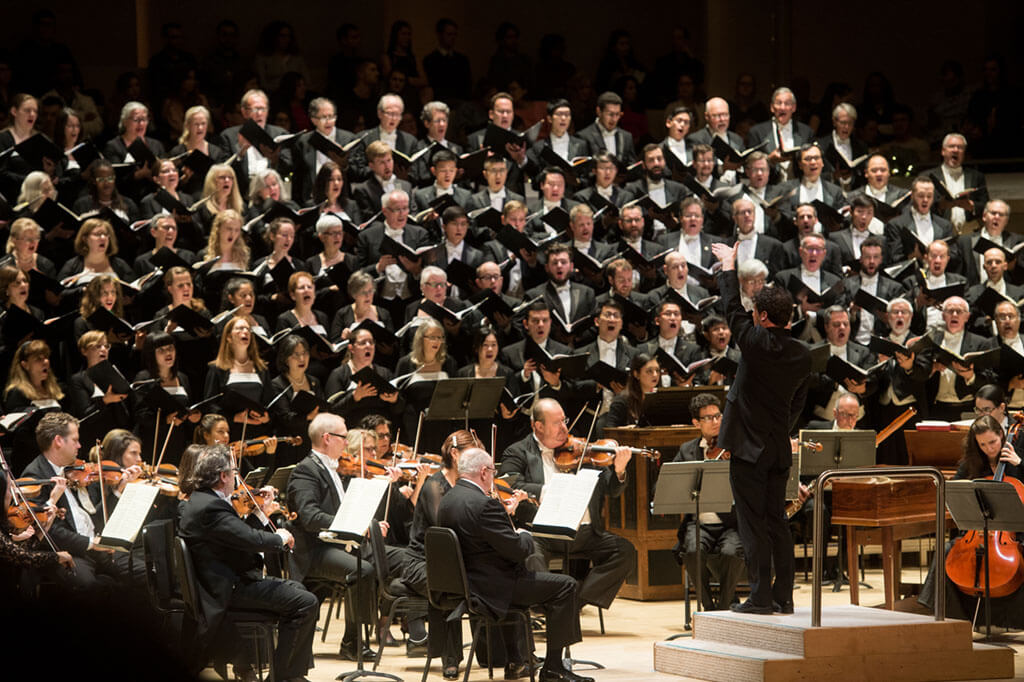
Handel’s Messiah: The Toronto Symphony Orchestra and The Toronto Mendelssohn Choir. Matthew Halls (guest conductor/TSO); Noel Edison (Artistic Director/TMC); Karina Gauvin, Krisztina Szabó, Frédéric Antoun, Joshua Hopkins (soloists) at Roy Thomson Hall. December 18-23, 2017. www.tso.ca.
In the age of sexed-up and dumbed-down Messiahs, it is good to be reminded how utterly self-refreshing Handel’s masterpiece is when addressed by the right personnel under a conductor with something to say. Such were the conditions that prevailed Monday in Roy Thomson Hall, where Matthew Halls led the Toronto Symphony Orchestra, Toronto Mendelssohn Choir and a crack quartet of Canadian soloists in through a performance that could fairly be called electrifying. The repeats are strongly recommended, even if they might lie outside the comfort zone of some listeners.
I confess to having a problem with the opening bars, taken far faster than the Grave marking would justify and with a leap-frog quality that neutralized the majesty we normally equate with a French overture. There were many fast tempos to come, which conspired with some traditional cuts to end the evening after two hours and 19 minutes, intermission and late-seating breaks included.
Happily, the dazzling approach suited many of the choruses, including “Hallelujah”, and “His Yoke is Easy”, though possibly by the end of Part 1 I had made some adjustments to my internal clock. Not that the energy of this performance (or any performance) can be ascribed to velocity alone. An early-music man of Oxford upbringing, Halls placed punchy stress on strong beats (it would be hard to imagine a more forcefully iambic “Behold The Lamb of God”) and limned phrases with many articulatory and dynamic nuances.
Slowdowns at final cadences were sometimes extended, sometimes minimal. It was characteristic of his dramatic mindset that after stretching out the solemn “iniquity of us all” sequence that ends “All We Like Sheep”, Halls had the tenor recitative burst in attacca, leaving us without even a moment to contemplate one of Handel’s most profound inspirations.
That sounds like a criticism, and I suppose it is, but I cannot emphasize too strongly the thoroughness and integrity of this interpretation or the high quality of its execution. The choir, on stage, was a marvel of clarity, numbering 144 according to the program but sounding both smaller in terms of agility and larger in the fullness of tone. This is a good time to mention that Noel Edison is the TMC’s artistic director.

The TSO, with a moderate (rather than tiny) string complement of 26, was likewise in virtuoso form, which almost created a problem. The crisp baroque style, necessary with period players and their hazy onsets, generates high definition indeed when combined with a disciplined modern unit. Even the continuo seemed unusually pronounced. Nonetheless, the no-vibrato violins were brilliant, and Andrew McCandless provided a golden obbligato in “The Trumpet Shall Sound”.
Trumpets were stationed in the choir loft in Part 1 to create a distant effect. Interesting that at a time when divided violins are the norm, Halls had them grouped traditionally as neighbours on this left. Like many conductors who do without a baton (not to mention a score), this one compensates with dramatic arm movements, ranging from karate chops to circles drawn vigorously in the air. It took a little getting used to from behind, but the players and choristers obviously responded positively to his athletic style.
On to the quartet, ladies seated stage right, gents stage left, and all required to walk to the centre for their solos, a theatrical touch. Most important, they were able to work lyrically within the often brisk frameworks Halls created for them. With her radiant tone and sure technique, Karina Gauvin was something close to the perfect Messiah soprano, assuring us in difficult times that “Our Redeemer Liveth”. Mezzo-soprano Krisztina Szabó provided warm sounds and good news at a fast tempo in “O Thou That Tellest”. I thought short versions of “He Was Despised” went out of style years ago. Halls is certainly not one to keep us waiting for the Messiah.
Tenor Frédéric Antoun was nicely in focus in the dramatic recitatives of Part 2, including a hypnotically slow “Rebuke”. Full points to Joshua Hopkins, classed as a baritone despite his ample low range. He was vibrant rather than blustering in “Why Do the Nations” and held the stage impressively in the aforementioned “Trumpet Shall Sound”.
It all came to a brilliant if early conclusion, and while I still wonder whether some element of contemplation was missing from this Messiah, I happily joined the standing and cheering crowd. We shall likely see Halls, former artistic director of the Oregon Bach Festival, with the TSO again. But there is no need to wait. There are repeat performances on Tuesday, Wednesday, Friday and Saturday.
#LUDWIGVAN
Want more updates on Toronto-centric classical music news and reviews before anyone else finds out? Follow us on Facebook or Twitter for all the latest.
![]()



